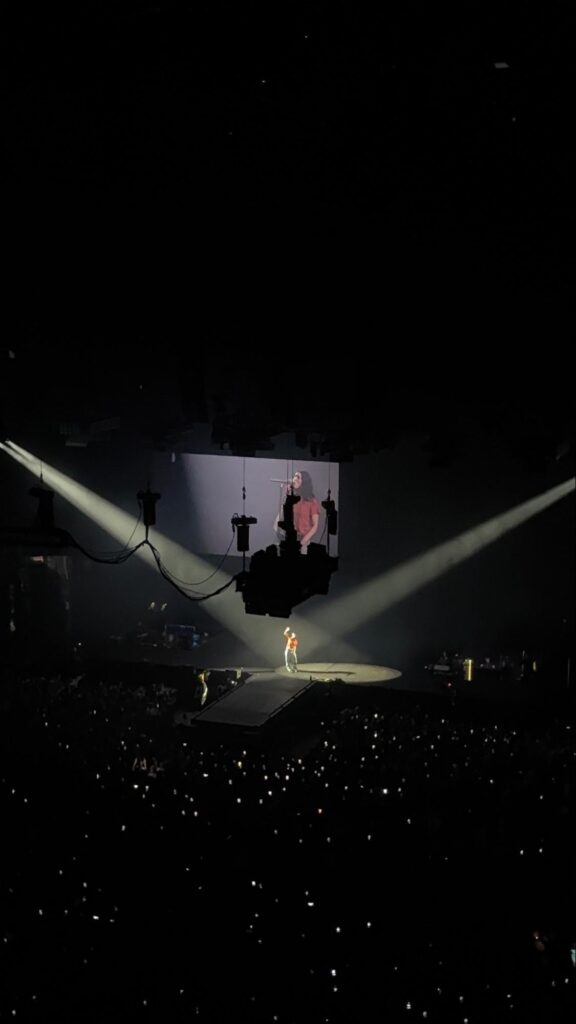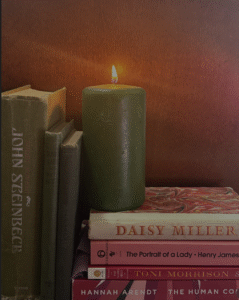In the crowded Moody auditorium at the University of Texas at Austin, the lights dimmed as thousands of fans screamed for the New Zealand singer that this reporter had traveled three hours to see. The first show of her Ultrasound Tour began with Lorde, dressed in blue ripped jeans, an orange T-shirt and no makeup, in the center of the stage under a spotlight. She stood on a platform that rose slowly as she sang “Hammer,” the opening song from her new album, Virgin.
Virgin is an album about womanhood, divine femininity and sexual awakenings. The album explores the guilt of unfulfilled promises that manifest in the treatment of one’s body and mind. In the middle of the concert, Lorde told the audience that she was done with secrecy with her fans. She sang to the corroded beat of “Broken Glass,” saying “Mystique is dead / Last year was bad.”
The album provides a vulnerable glimpse into Lorde’s battle with eating disorders and her treatment of her body, with lyrics such as “Felt great to strip / New waist-to-hip.” In “Favourite Daughter,” she also sang about her complex relationship with her mother: “Breaking my back just so you’ll say that I’m a star / Panic attack just to be your favourite daughter.”
Leaning into the intimacy and transparency of the album, Lorde stripped during the show and sang in her Calvin Klein boxers and T-shirt. During her performance of “Man of the Year,” the album’s second single, Lorde sang in her jeans with duct tape over her breasts, like in the song’s music video. In that video, Lorde dances cathartically in an apartment filled with dirt, singing, “Oh who could give me lightness? / Way he flow down through me? / Love me like this / Now I’m broken open.” In an interview with Rolling Stone, Lorde stated that this was “the song I’m proudest of on Virgin.”
Lorde made her way through the crowd during the last song of the album, “David,” comparing herself to Michaelangelo’s David in one of the most raw songs about feeling molded and carved for the music industry.. She sings, “Oh dark day was I just young blood to get on tape? / ’Cause you dimmed me out when it got hard/ Upper cut to the throat I was off guard / Pure heroine mistaken for featherweight.” In the final line, the phrase “pure heroine” is a reference to Lorde’s debut album of the same name. Here, Lorde asserts that the album’s fame and cultural impact, with hit songs like “Ribs,” was mistaken for something frivolous and light, like feathers.

In his review of the album, New York Times pop critic Jon Caramanica described the third song, “Shapeshifter,” writing that “over a brittle, skittish post-drum-and-bass beat, Lorde sings about sexual hunger, and what parts of yourself you have to release to embrace it. But in the chorus, the song morphs into a metaphor about fame and untouchability, and how unfulfilling those things ultimately are.”
In the track “Clearblue,” Lorde sings with almost no background music as she details the terrifying process of taking a pregnancy test and the result being negative. “I’m scared to let you see into the whole machine, leave it all on the field / Your metal detector hits my precious treasure / I’m nobody’s daughter / Yeah, baby, I’m free, I’m free / Free, I’m free.”
In light of the recently signed Texas House Bill 7 that will permit private citizens to sue anyone who manufactures, distributes or mails abortion medication to or from Texas, the message of “Clearblue” and Lorde’s album are more relevant than ever. To scream at the top of one’s lungs about birth control and body dysmorphia–as this crowd did–in a state that is trying to silence conversations on these topics is a strangely surreal experience. As state governments across the nation tighten and restrict women’s access to abortion and birth control, pop culture that fosters a dialogue on women’s bodily autonomy is vital. On resources for reproductive health, click here.





